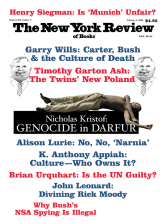In response to:
Fringe Government from the October 6, 2005 issue
To the Editors:
My intuitive understanding that the Catholic Church has suffered a stealth invasion of the Christian right has been greatly informed by Garry Wills’s article on “Fringe Religion” [NYR, October 6, 2005].
That said I don’t believe the label “fringe” enlarges our comprehension of the specific new religious movements that are changing both American religion and American politics. The most important new religious movement that seems to explain some of the features Wills elucidates of the minority religious right has a name: Christian Reconstructionism.
CR traces its ancestry to Oliver Cromwell’s revolution and to its political theologian, Samuel Rutherford, author of the Reconstructionists’ hallowed (seventeenth- century) text, Lex Rex. Indeed, in Cromwell’s less confident moments, he considered the option of fleeing to the Massachusetts Bay Colony, whose strident Puritanism is counted by Christian Reconstructionists as the founding ideology of the United States, which they are attempting to reinstate as “theonomy.”
That the Christian right and the Catholic Church have been influenced by Reconstructionism is evidenced in Wills’s puzzlement over Richard John Neuhaus’s identification of the “theological origins of democracy” with Oliver Cromwell. The English Revolution of Cromwell and Rutherford placed the legitimacy of the state in the hands of Parliament by attacking the monarchic doctrine of the king as the sole, legitimate source of law. This did indeed lead toward democracy, much as the doctrine of “rule by the clerics” and not by the shah might eventually produce democracy in Iran.
Wills credits Francis Schaeffer as the formulator of the “co-belligerency” strategy of Catholic hierarchs and the Christian right, but he neglects to mention the perhaps even broader influence of Rousas John Rushdoony, philosopher of Reconstructionism, on contemporary “social issues” in politics. Schaeffer’s theology of Dominionism differs only in a few details from Rushdoony’s and they are both disciples of Cornelius van Til. The radical anti-abortion movement of Randall Terry and assassin Paul Hill espoused Christian Reconstructionism, also known as “Reformed Presbyterianism.”
In my opinion the Catholic hierarchy has naively allowed itself to adopt part of the Reconstructionist agenda, notably in its association with anti-gay groups through its “Marriage Project,” based at Columbia School of Law at CYU, and in its uncritical embrace of anti-abortion and anti-euthanasia associates, who may hope to replace the misguided Catholic Church with the true Catholicism of Reformed Presbyterianism. Schaeffer’s program of “co-belligerency” actually fosters that goal.
No understanding of the current political evangelism of Christian Reconstructionists is complete without reading an obscure but influential book by Joe Morecraft III, currently a leading CR propagandist, entitled With Liberty and Justice for All. It expounds theonomy as the ultimate concern of this new movement, which attempts to align itself with and to attract likely converts among conservative Christians, law students, judges, and politicians, in order to effect a political reformation in the United States.
Like radical Salafism and pan-Islamism, Christian Reconstructionism and its cousin, Dominionism, are transdenominational. Their goal, however, is narrowly defined: it is to “reconstruct” the entire American Christian congregation and political establishment from within.
Jeane E. Rosenfeld, Ph.D.
Academic Researcher
UCLA Center for the Study of Religion
This Issue
February 9, 2006



